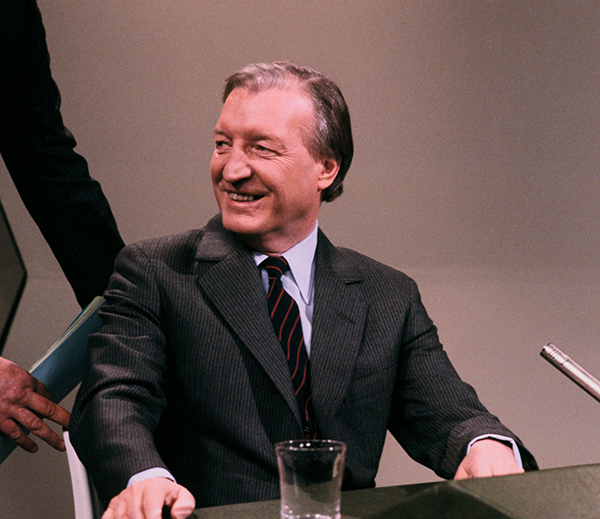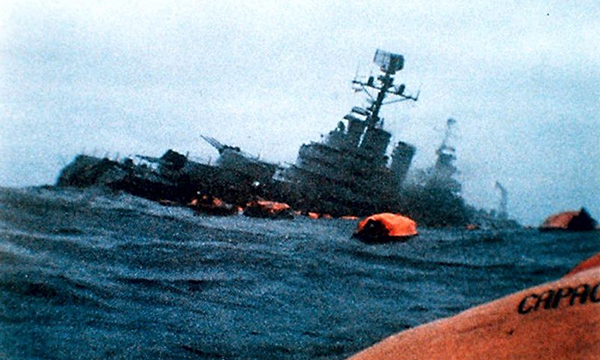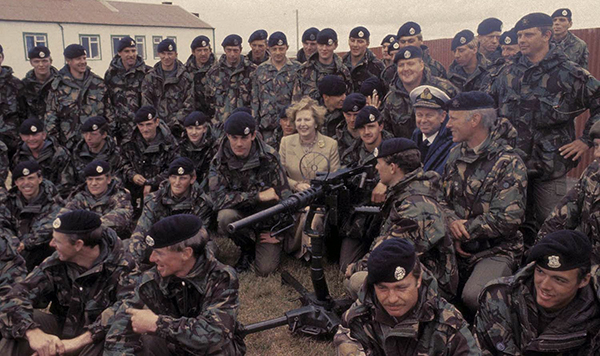WHEN C.J. HAUGHEY ‘DROVE MAGGIE MAD’—IRELAND AND THE FALKLANDS WAR
Published in Features, Issue 2 (March/April 2022), Volume 30By Stephen Kelly
Ownership of the Falkland Islands, an archipelago of an estimated 200 islands scattered in the South Atlantic, 300 miles off the coast of Argentina and approximately 8,000 miles south of the United Kingdom, was bitterly disputed between the two states. At the time approximately 1,900 people lived there. Most of these inhabitants firmly opposed integration with Argentina and wanted to remain a British dependency. In Argentina, however, the repressive military junta dictatorship under General Leopoldo Galtieri claimed Argentinian ownership of the islands.
Argentinian–British relations reached a crisis point on 2 April 1982, following the invasion of the Falkland Islands by Argentinian forces. On receiving news of this, the British government under Margaret Thatcher was reportedly shocked and furious. Thatcher’s gut response was to retaliate with military action. Following a hastily arranged meeting of her cabinet on the same day, she sanctioned the sending of a British task force to reclaim the Falkland Islands.

Above: Taoiseach Charles J. Haughey—he initially supported the British position on the Falkland Islands, including Ireland’s support on the UN Security Council for the British-sponsored Resolution 502. (Alamy)
BRITISH DIPLOMATIC OFFENSIVE
To Thatcher’s surprise, not to mention frustration (chiefly directed at the Foreign and Commonwealth Office (FCO) and the British security services), she learned that, while it would take three days to assemble the task force, it would take a further three weeks for it to reach the Falkland Islands. Given the length of this delay, British policy, for the meantime at least, turned away from the military sphere to the diplomatic—to the United Nations (UN), to be precise.
Thatcher immediately went on a diplomatic offensive. On Saturday 3 April, following a request by Anthony Parsons, British permanent representative at the UN, a hastily arranged emergency meeting of the UN Security Council was held. After intense diplomatic efforts, including several telephone conversations between Thatcher and French president François Mitterrand and King Hussein of Jordan respectively, the British managed to secure the safe passage of Resolution 502 through the UN Security Council. This resolution called for an immediate cessation of hostilities; an immediate withdrawal of Argentine forces from the Falkland Islands; and, lastly, the commencement of negotiations.
IRISH INVOLVEMENT
It was on the morning of 3 April that the Irish government became directly involved with the unfolding events. During this crisis, apart from the leading role played by Taoiseach Charles J. Haughey personally in Dublin, Irish government policy was also directed by Ireland’s representative at the UN in New York, Noel Dorr (who dealt with the question of resolutions), and by an Irish delegation led by Irish Minister for Foreign Affairs Gerald Collins in the European Economic Community (EEC) headquarters in Brussels (Collins and his delegation dealt with sanctions). Following discussions between Haughey and his senior Department of Foreign Affairs (DFA) officials, Dorr was instructed to support the British-sponsored Resolution 502, which was to be formally proposed later that evening.
Coincidentally, at this time Ireland was a member of the UN Security Council, having taken up its membership on 1 January 1981. As requested by Haughey, at the UN Security Council meeting Dorr cast Ireland’s vote in favour of Resolution 502. The British government secured the necessary ten votes to ensure its adoption, while at the same time avoiding a veto from both China and the Soviet Union.
The Irish government’s willingness to support the British government’s stance on the Falklands War was warmly welcomed by London. On 5 April, the same day as Lord Carrington’s resignation from the British cabinet over the FCO’s handling of the Falklands crisis, the British embassy in Dublin passed on London’s gratitude for Irish support. British embassy official David Tatham noted that the ‘adoption of the resolution was a considerable achievement’. The following day, 6 April, Thatcher personally contacted Haughey to express her thanks for Dublin’s support and to request ‘his personal help’ and additional support for the British government’s calls for the imposition of economic and financial sanctions by the European Community against Argentina.
Later that day, 6 April, the Irish government held a cabinet meeting to consider Thatcher’s request. No formal decision was taken at this meeting. In fact, Dublin waited a further four days, until 10 April, before agreeing to support the implementation of economic sanctions. The Irish cabinet agreed that these measures were to remain in force until 17 May, when they could be renewed. Thereafter, to quote a recently declassified Irish governmental memorandum, a ‘period of relative lull began’ in which the focus of attention turned towards the UN’s efforts to achieve a political solution to the crisis.
It was events on the ground in the Falkland Islands that brought relations between the United Kingdom and Ireland to their lowest ebb since the Second World War (notwithstanding the political fallout from the events of Bloody Sunday in January 1972). On 25 April the British attacked the Argentinian submarine Santa Fé (S-21), which was soon followed by a series of air raids on Port Stanley during the first days of May.
In response to the ‘rapid deterioration’ of the Falklands crisis, the Irish cabinet convened on Sunday 2 May. Following this meeting, an Irish government statement was issued expressing concern at the escalating military situation. Significantly, the statement also reiterated ‘Ireland’s “traditional policy of neutrality” in military conflicts’. Such a reference to Ireland’s ‘traditional policy of neutrality’ was to herald a significant shift in the Irish government’s policy vis-à-vis the Falklands dispute.
Sinking of the Belgrano
Later that same evening, at approximately 8pm British time, the single most controversial military action of the Falklands War occurred when the Argentine cruiser Belgrano was sunk by a British nuclear submarine, HMS Conqueror, some 200 miles outside the so-called ‘exclusion zone’ surrounding the Falkland Islands. The Conqueror had fired without warning on receiving orders from Thatcher’s war cabinet in London. Approximately 200 of the 1,000 crew were killed immediately; the final death-toll was 368 Argentine sailors.

Above: The Argentinian cruiser General Belgrano sinking after being torpedoed without warning on 2 May 1982 by British nuclear submarine HMS Conqueror, some 200 miles outside the so-called ‘exclusion zone’. Irish policy thereafter shifted decisively from support of the British position to neutrality.
Argentine forces wasted little time in exacting their revenge. Shortly after lunch on Tuesday 4 May, the British destroyer HMS Sheffield was attacked and hit by a missile launched by an Argentinian aircraft, with the loss of 30 crew members. Thatcher took the news of this act of aggression ‘very hard’, sitting in her Commons Room in floods of tears.
In response to these escalating events, the Irish cabinet hurriedly convened once again on the afternoon of 4 May. Ministers agreed that Ireland would immediately take up a neutral stance on the Falklands issue and seek the withdrawal of EEC sanctions against Argentina. This decision, as Laurence Freedman noted, ‘marked a decisive shift’ in Irish government policy. Following the cabinet meeting, by Haughey’s express orders, a press statement was issued relaying the Irish government’s new policy and also calling for a meeting of the UN Security Council to put forward a new resolution demanding the cessation of hostilities between Argentina and Britain. Significantly, no mention was made of Resolution 502.
Addressing Dáil Éireann later that evening, Haughey outlined the Irish government’s policy in relation to the Falklands War. ‘The Irish Government’, he explained, ‘regard the application of economic sanctions as no longer appropriate and will therefore be seeking the withdrawal of these sanctions by the Community.’ Accordingly, he noted that the Irish government sought an immediate meeting of the UN Security Council in order to prepare a new resolution calling for: ‘(1) An immediate cessation of hostilities by both British and Argentinian forces; and (2) The negotiation of a diplomatic settlement under the auspices of the UN’.

Above: The liner QE2, which had been requisitioned as a troop-carrier, on its return to Southampton from the Falklands War. (Alamy)
‘IRRITATING AND UNHELPFUL’
Thatcher was infuriated on reading the contents of Haughey’s speech. As Walter Kirwan, a senior Irish government civil servant recalled, Haughey’s decision ‘drove Maggie mad!’ According to one British official, Haughey’s behaviour had shown ‘breathtaking irresponsibility’. Leonard Figg, British ambassador to Ireland, described Haughey’s decision as ‘irritating and unhelpful’.
Despite the British government’s protests, on 7 May the Irish government issued a further public statement, again calling for the withdrawal of economic sanctions against Argentina. Haughey dealt with these developments during a speech to Dáil Éireann on 11 May. The Irish government, he explained, had decided to reassert ‘our traditional policy of neutrality’.
Haughey’s playing of the ‘neutrality card’ to justify no longer supporting the British government vis-à-vis the Falklands dispute was sceptically received by London. Rather, in British thinking, as outlined by Figg, Haughey had evoked Ireland’s traditional stance on neutrality ‘as a cloak for an anti-British attitude’ for both home and international consumption—in other words, the taoiseach was using the crisis to help promote his image as an Irish republican par excellence.
Haughey certainly also viewed the unfolding events on the Falkland Islands as an ideal opportunity ‘to get his own back’ on Thatcher. The previous year, during the height of the 1981 H-block hunger strike, Thatcher’s categorical refusal to permit Haughey a mediatory role in helping to conclude the hunger-strikers’ campaign had deeply offended him. He therefore saw the Falklands crisis as an opportunity to undermine the British prime minister’s political credibility on the international stage and at the same time to burnish his image as a firebrand Irish republican in the eyes of his supporters within the Fianna Fáil party and the wider electorate in the Republic of Ireland.
Eventually, in mid-June 1982, the Falklands War ended after 74 days of conflict. British victories at Goose Green (27–28 May) and ultimately Port Stanley (11–13 June) culminated in the surrender of the Argentinian forces on 14 June. Thatcher and her ministerial colleagues basked in the glory of victory. At a meeting of the British cabinet on 15 June, the morning after Argentina’s surrender, a sense of excitement was in the air, but it was a victory tainted by the loss of so many young lives on both sides. In total, 649 Argentine military personnel, 255 British military personnel and three Falkland Islanders died during the conflict.
A PERSONAL VICTORY FOR THATCHER
Significantly, the UK’s defeat of Argentina represented a victory for Thatcher personally. She had taken a massive gamble, but in the end it paid off. Her popularity soared in the aftermath of the conflict. She went from being one of the most unpopular British prime ministers of modern times to securing a landslide victory in the general election of 1983. Thereafter, she became a massive celebrity throughout the world, from the US to the USSR.

Above: Margaret Thatcher surrounded by troops on a January 1983 visit to Goose Green, Falkland Islands, where the Parachute Regiment had secured a crucial victory seven months earlier. (Rare Historical Photos)
In the arena of Anglo-Irish relations, the Falklands War cast a long shadow. Haughey’s decision to withdraw support for sanctions against Argentina smacked of political opportunism. Although he propagated the message that the Irish government’s volte-face on the issue of sanctions against Argentina was based on long-held principles associated with Irish neutrality, the available evidence provides ample proof to the contrary. In fact, throughout the conflict Haughey’s decision-making process was driven by an opportunistic and deep-rooted anti-British attitude.
The net result of Haughey’s exploits was that in the space of two years Anglo-Irish relations under his stewardship had gone from friendly co-operation and mutual respect between two sovereign countries to the depths of mutual antagonism and ill feeling. Although it would be unfair to blame Haughey solely for this situation, he certainly played a leading role in helping to undermine the potential gains in the field of British–Irish relations that he had achieved together with Thatcher since first becoming taoiseach in 1979.
Stephen Kelly is the author of Margaret Thatcher, the Conservative Party and the Northern Ireland conflict, 1975–1990 (Bloomsbury Press, 2021).
Further reading
L. Freedman, The official history of the Falklands campaign: origins of the Falklands War, Vol. 1 (London, 2005).
J. Joyce & P. Murtagh, The Boss (Dublin, 1997).
S. Kelly, ‘An opportunistic Anglophobe: Charles J. Haughey, the Irish government and the Falklands War, 1982’, Contemporary British History 30 (4) (2016), 522–41.
C. Moore, Margaret Thatcher: the authorized biography, Vol. 1: Not for turning (London, 2013).
















